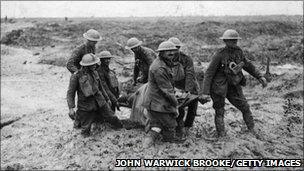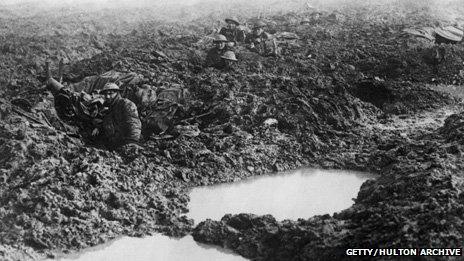Passchendaele: Appeal launch for Welsh battle memorial
- Published

The Battle of Passchendaele lasted from 31 July to 6 November, 1917
An appeal has been launched to commemorate soldiers from Wales who were killed in one of the most notorious battles of World War I.
Some 70,000 British soldiers, including hundreds from Wales, died in the Battle of Passchendaele in Ypres, Belgium.
The Passchendaele Society in Belgium wants to raise 60,000 euros (£52,000) for a Welsh memorial.
Organisers hope it will become a memorial to all Welsh soldiers who died in the Great War.
The appeal was unveiled at an event close to where many of the Welsh soldiers came to grief in Langemark, near Ypres.
It featured the North Wales Rugby Choir, who also performed a concert later in the day with proceeds going towards the appeal.
Retired police officer Peter Jones, who is co-ordinating the appeal in Wales and was in Belgium for the event, said it was important to remember the Welsh soldiers who had made the ultimate sacrifice.
"It's very worthwhile. Everybody else has got a monument out there - the Irish and the Scottish - but we don't have anything at all," he said.
"On the Somme in France there is a memorial for the Welsh but not here.
"There is a lot of support for it. Whether that support will be converted into cash we will have to see."
Passchendaele Society secretary Erwin Ureel said his group was not the only one in Belgium looking to mark the contribution of the Welsh.
"This was something we had been thinking of for a number of years - we wanted to do something for the Welshmen," he said.
"We discovered that in Langemark, other people were also looking at doing something so we got together and decided to support a new project.
"We wanted to raise a memorial in the shape of a Welsh dragon similar to the one at Mametz Wood [to the 38th (Welsh) Division in the Battle of the Somme]."
Dreadful muddy conditions
The Battle of Passchendaele, also known as the third battle of Ypres, saw hundreds of thousands of casualties on both sides.
It is notorious not only for the number of deaths, but also the dreadful muddy conditions in which it was fought.
Mr Ureel said: "I think Passchendaele was one of the main symbols of the Great War with the bloodshed and the appalling conditions.

The mud at Passchendaele was notorious
"Passchendaele conditions were worse than the Somme. There were the stories of the mud, the clay and the rain.
"It also became an everyman's war because in 1916, conscription was introduced. There were a large number of conscripts by the time of Passchendaele."
Welsh language poet Hedd Wyn was one of the most high-profile Passchendaele casualties.
He died at the battle of Pilckem Ridge and posthumously won the 1917 National Eisteddfod chair six weeks later.
- Published4 April 2011